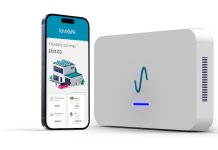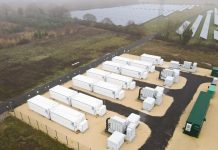 Nissan sees 2019 as “a breakthrough year” for grid services via electric vehicles. The carmaker could potentially become an energy supplier soon after that.
Nissan sees 2019 as “a breakthrough year” for grid services via electric vehicles. The carmaker could potentially become an energy supplier soon after that.
“It is something that could happen. In the UK there are companies offering electricity that are not typical utilities, so it is possible,” Eduardo Mascarell, head of energy aggregation and vehicle to grid at Nissan Europe, told The Energyst.
“So far, we are just concentrating on EVs and battery solutions. We will see in one or two years if it makes sense to get into that [energy supply] business as well, but why not?”
Cars as power plants
Nissan has almost 400,000 EVs on the road worldwide, hypothetically equating to “about 4 gigawatts already connected to the grid,” if all were connected via 10kW bi-directional chargers said Mascarell.
Nissan has sold 28,000 EVs in the UK to date. In 2019 the company hopes broader EV sector growth will continue at the current rate of “50-60 per cent a year, and even higher in some countries,” said Mascarell.
He hopes 2019 will also mark the turning point for vehicle-to-grid (V2G) services – and the company will launch its own designed and specified chargers that enable V2G services in the second quarter.
“I think 2019 has to be the breakthrough [for V2G], because we are moving from charging infrastructure that was costly to manage to something that is smaller, bi-directional and competitive in terms of cost,” he said. Moreover, other infrastructure providers are coming to market. “Five or six will compete, which will reduce costs and improve service,” added Mascarell.
Free fuel
Mascarell said last year that Nissan’s trials in Denmark indicated EVs could earn around €1,300 a year if used to help balance the grid. “In countries like the UK, that are more dynamic and flexible, that could be even higher,” he said.
However, “you cannot transfer all of that revenue direct to the EV owner,” said Mascarell, as other parties would take a cut. “But it would not be very challenging to offer the customer something like free transportation – all the electricity you use for driving the car could be covered by these kind of operations.”
Mascarell said it is incumbent on carmakers and service providers to market propositions in those terms. “Not to talk about kilowatts or kilowatt hours, or frequency services, because that is complex. But how to make things really easy for people to understand that the car is no longer a car, but a platform that gives you transport services and energy services.”
Service propositions are also not just about money, said Mascarell.
“People are not always looking to save pennies or pounds, but to have a sensation of control: I am managing my own environment, my data, appliances and energy. These things are coming together and the EV will be a part of that.”
Grid constraint or solution?
Smart charging and vehicle to grid is necessary to decarbonise power and transport without having to build more infrastructure than necessary, said Mascarell.
“If we only use EVs as big, dumb washing machines with wheels, that will of course create grid constraints. But we can turn them into something that actually helps the grid,” he suggested.
“In the future you will see that we are not just talking about ‘an end user’, but entire districts and neighbourhoods collectively helping to balance the grid, becoming new market agents that create a sustainable solution for the whole system.”
Businesses or households first?
Both business and household markets are “really attractive” in terms of vehicle to grid potential, said Mascarell, though he thinks the former may initially scale faster.
“B2b is easier because you can accesses multiple EVs in one shot. Fleet managers have parking lots, the space to install chargers and enough power [capacity] to include charging and discharging solutions,” he said. “It is also possible for them to build an ecosystem, based on solar PV, batteries and EVs that can help them reduce peak consumption and do other things.”
Second life batteries
Second life batteries could form part of that solution, suggested Mascarell, with Nissan selling domestic and commercial battery packs made from used car batteries.
Once EV batteries degrade to “about 70% state of health”, Nissan recovers them, but degradation is not uniform. “Once you open up the pack you find many modules over that percentage – even up to 85 per cent state of health. We reuse those with enough lifetime and it is very competitive,” said Mascarell.
Range anxiety
While EV sales are rising, range anxiety remains a concern – and could prove a roadblock for companies with vehicle to grid ambitions. Mascarell thinks those fears will subside as the charging infrastructure rollout gathers pace and carmakers can demonstrate that using cars to balance the grid will not drain batteries.
“Our trials in Denmark, the UK and other places in Europe prove the technology is not a challenge. The challenge is the customer proposition – and we need some time for people to learn that the technology is useful and driving patterns are okay for EVs and vehicle to grid,” he said.
“People still have the same concerns, but those with range anxiety are those who have never driven an EV.”
Related stories:
Nissan: Vehicle to grid services will not drain EV batteries
Nissan signals roadmap from carmaker to energy services company
BT and Eon pledge to electrify fleet by 2030
Sir Terry Leahy on EVs, infrastructure and pitching to the board
Chargepoint raises £189m to fund EV charging infrastructure
Total partners with Chargepoint to bundle energy and EVs to businesses
Bring forward zero carbon transport target, MPs urge
Octopus backs flex and EVs for growth
Nissan and Eaton rollout commercial scale battery
Pivot Power makes huge play for 2GW battery storage and EV charging network
You only live twice: Battery storage from second hand EV powerpacks
‘Land grab’ for EV car parks and revenue
Energy managers ‘to become fleet managers as EVs rise’
Electric vehicle boom no sweat, says National Grid
Electric vehicles ‘won’t require new power stations’, say analysts
Northern Powergrid: EVs a resource not a problem
EVs ‘could provide 11GW of flex’
National Grid focuses on bringing smaller firms and EVs into flexibility
Carmakers become aggregators as DNOs fear overnight EV boom
Tesla: People don’t engage with energy bills, but they will have to
Lord Redesdale: Idea of EVs as battery storage is “complete crap”
Follow us at @EnergystMedia. For regular bulletins, sign up for the free newsletter.



